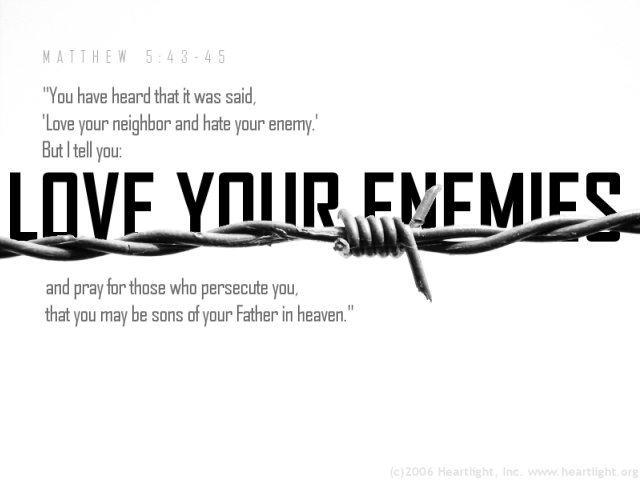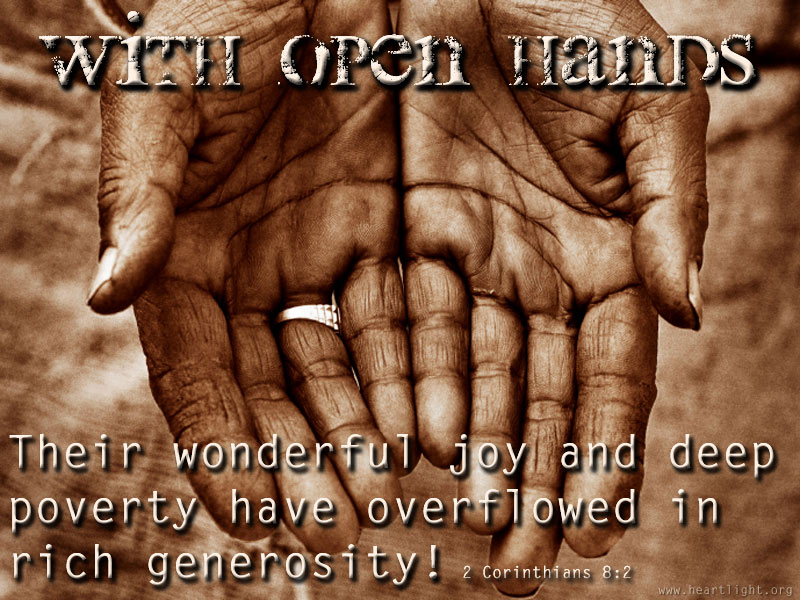It is hard to accept the gift of salvation when we keep trying to help God provide it. Psalm 51 (Psalm 51:1-19) is thought to be a Psalm of David, written when his adulterous affair with Bathsheba was exposed by God's prophet, Nathan. Only God could restore the relationship broken by David's sin. As David laid bare his heart and soul, he said to God:
You do not delight in sacrifice, or I would bring it;
you do not take pleasure in burnt offerings.
My sacrifice, O God, is a broken spirit;
a broken and contrite heart you, God, will not despise (Psalms 51:16-17).
No good work we might do will make God love us more. No sin we might commit will make God love us less. Completely at his mercy and secure in his love, we pray to the Father:
Create in me a pure heart, O God, and renew a steadfast spirit within me (Psalms 51:10)
The self-righteous won't pray that prayer and the self-sufficient don't feel the need. Those who are whole may not need a physician, but those of us who are broken need Him every hour.
The Heart of the Matter
"He started it!"
Any parent of more than one pre-teen child has heard that reason for a fuss. Retaliation is just part of our nature. We are eager to blame others for creating discord and slow to take the first step toward reconciliation. Years ago, one of our small children was at least creative when he explained, "He hit me back first!"

I don't remember much of my high school Latin, but I know we live in a quid pro quo or "this-for-that" world. We are quite willing to offer a favor or gift with the expectation that we will receive something in return. You scratch my back, and I'll scratch yours. If I didn't get a Christmas card from you last year, you're not getting one from me this year. If I make a contribution to your political campaign, I expect access and your vote for my favorite cause.
The logjam will never be broken and the conflict will never end unless somebody is more interested in reconciliation than retaliation. Well, Jesus is that somebody whose main interest is reconciliation. His words in the Sermon on the Mount (Matthew chapters 5-7) are so familiar that we read over them quickly with hardly a pause:
You have heard that it was said, "Eye for eye, and tooth for tooth."But I tell you, Do not resist an evil person. If someone strikes you on the right cheek, turn to him the other also. And if someone wants to sue you and take your tunic, let him have your cloak as well. If someone forces you to go one mile, go with him two miles... (Matthew 5:38-41).

Lord, you can't be serious! What if I run out of cheeks, or cloaks, or energy?
When someone gives you a hard time, respond with the energies of prayer, for then you are working out of your true selves, your God-created selves. This is what God does. He gives his best - the sun to warm and the rain to nourish - to everyone, regardless: the good and bad, the nice and nasty. If all you do is love the lovable, do you expect a bonus? Anybody can do that. If you simply say hello to those who greet you, do you expect a medal? Any run-of-the-mill sinner does that.In a word, what I'm saying is, Grow up. You're kingdom subjects. Now live like it. Live out your God-created identity. Live generously and graciously toward others, the way God lives toward you (Matthew 5:44-48).
The God Standard
How does God live toward us?
My friend Randy Harris, who teaches at Abilene Christian University, recently told a group of students, "Silence is the scariest thing in the world." He told of spending 40 days with hermits at Lebh Shomea in a remote wilderness. No cell phone, no TV, no internet, no wifi - just silent contemplation and a few chores. What did he learn from those days of exile? "God loves me. Nothing I could ever be could make God love me more than he does right now."
One of my most painful preaching experiences came at the close of a stem-winding sermon on the importance of being faithful to God. That's a worthy subject, but my definition of faithfulness was heresy if not blasphemy. I don't recall my exact words, but I was basically telling people that if they wanted to go to heaven, they had to come to church more, pray more, love more, give more, and do more. Standing before the church, I was barely conscious of the words being sung as invitation:
I hear the Savior say,
"Thy strength indeed is small;
"Child of weakness, watch and pray,
Find in me thine all in all."
Then, the Refrain made me painfully aware that the hymn writer knew more gospel than I did:
Jesus paid it all,
All to him I owe;
Sin had left a crimson stain,
He washed it white as snow.
He started it when he created us in his own image. He finished it at the cross when he paid a debt he did not owe because we owed a debt we could not pay.
Because of that grace, we live graciously toward each other and toward others. We join Jesus in living this way:
You're kingdom subjects. Now live like it. Live out your God-created identity. Live generously and graciously toward others, the way God lives toward you.













Comments
Have thoughts on this article? Leave a comment